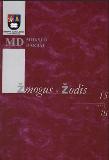Frankofonizmai arba regionalizmai
Regional French Expressions
Author(s): Vilhelmina VitkauskienėSubject(s): Foreign languages learning
Published by: Vytauto Didžiojo Universitetas
Keywords: acadism; africanism; francophony; francophonism; regional French expression; regional French dialect; cadism; helvetism; kamfrangle (carangle); belgicism; flandrism; canadism; quebecism, cultural language; education language
Summary/Abstract: Article deals with a socio-linguistic topic of African French expressions which differ significantly from those in normative French, with a specific focus on the relevant Cameroon dialect, kamfrangle. Notions of africanisms or kamfrangle are relatively new, appearing in dictionaries only in the late 20th century. These developing regional phenomena affect modern French language studies, focusing on versions of the language as practised beyond the original metropolitan area. The origin of regional French dialects and relevant expresssions varies depending on a geographical area, including Belgium, Switzerland, Canada, Antiles, Mauricius, Cameroon and many more. This serves as a confirmation that there is more than one standard version of common French today. The French languge in Africa interacts with a varety of local languages. The mixing allows to comprehend the specifics of Cameroon French (kamfrangle) in particular, and the role of French in Africa in general. Information from diferent sources has allowed us to analyse the most significant expressions in African French dialects and their mode of construction: derivations (bouffement m nourriture – food), compositions (mange-mil m policier – policeman), stylistic figures, metaphors (guitare f guitar – infectious skin irritation), onomatopées (là là là loc (à cet instant précis, maintenant même) – instantly, immediately), abreviations (pépas n m pl papiers – papers, documents), semantic change (chèk m danse – dance), franconisation of local languages (waka v marcher – walk), neologisms (clando – illegal cab). The socio-linguistic analysis has led to identification of the language interaction, interference (literal translations), richness of the French language, phonetic changes (dissapearance of r), neologisms (salaka m débandade f – havoc), gramatical particuliarities (errors in use of articles, changes in gender of nouns). Most imrpotantly, these regional developments have influenced lexics in a way that many of the same words in French-speaking foreign regions now have a different meaning than in France.
Journal: Žmogus ir žodis
- Issue Year: 15/2013
- Issue No: 3
- Page Range: 53-59
- Page Count: 7
- Language: Lithuanian

